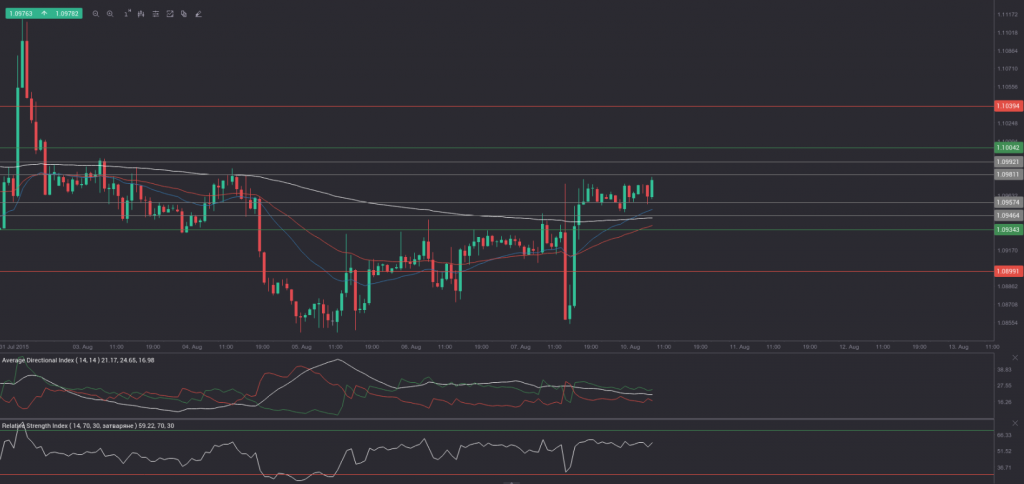Friday’s trade saw EUR/USD within the range of 1.0854-1.0981. The pair closed at 1.0969, soaring 0.40% on a daily basis, while marking a third consecutive day of gains. The daily high has also been the highest level since August 4th, when the cross registered a high of 1.1245. In addition, the daily rate of increase has been the sharpest one since July 31st, when the pair appreciated 0.50%.
At 7:18 GMT today EUR/USD was up 0.07% for the day to trade at 1.0972. The pair touched a daily high at 1.0979 at 7:05 GMT.
No relevant macroeconomic reports are to be released from both the United States and the Euro area today.
Correlation with other Majors
Taking into account the week ended on August 9th and the daily closing levels of the major currency pairs, we come to the following conclusions in regard to the strength of relationship:
EUR/USD to NZD/USD (0.8115, or very strong)
EUR/USD to AUD/USD (-0.0065, or very weak)
EUR/USD to USD/CHF (-0.0151, or weak)
EUR/USD to GBP/USD (-0.4551, or moderate)
EUR/USD to USD/JPY (-0.5351, or strong)
EUR/USD to USD/CAD (-0.6701, or strong)
1. During the examined period EUR/USD moved strongly in one and the same direction with NZD/USD.
2. EUR/USD moved strongly in the opposite direction compared to USD/JPY and USD/CAD during the past week.
3. The correlation between EUR/USD and GBP/USD was moderate.
4. The strength of relationship between EUR/USD and USD/CHF was insignificant during the examined period.
5. EUR/USD and AUD/USD moved almost independently.
Bond Yield Spread
The yield on German 2-year government bonds went as high as -0.237% on August 7th, after which it slid to -0.261% at the close to lose 1.9 basis points (0.019 percentage point) on a daily basis, while marking a second consecutive day of decrease.
The yield on US 2-year government bonds climbed as high as 0.749% on August 7th, or the highest level since August 5th (0.760%), after which it fell to 0.721% at the close to gain 1.2 basis points (0.012 percentage point) for the day. It has been the first gain in the past three trading days.
The spread between 2-year US and 2-year German bond yields, which reflects the flow of funds in a short term, widened to 0.982% on August 7th from 0.951% during the prior day. The August 7th yield spread has been the most notable one since August 4th, when the difference was 0.983%.
Meanwhile, the yield on German 10-year government bonds soared as high as 0.728% on August 7th, after which it slid to 0.658% at the close to lose 4.9 basis points (0.049 percentage point) compared to August 6th, while marking a second straight day of decrease.
The yield on US 10-year government bonds climbed as high as 2.254% on August 7th, after which it slipped to 2.166% at the close to lose 6.1 basis points (0.061 percentage point) on a daily basis, while marking a second consecutive day of decline.
The spread between 10-year US and 10-year German bond yields narrowed to 1.508% on August 7th from 1.520% during the prior day. The August 7th yield difference has been the lowest one since July 10th, when the spread was 1.505%.
Daily and Weekly Pivot Levels
By employing the Camarilla calculation method, the daily pivot levels for EUR/USD are presented as follows:
R1 – 1.0981
R2 – 1.0992
R3 (range resistance – green on the 1-hour chart) – 1.1004
R4 (range breakout – red on the 1-hour chart) – 1.1039
S1 – 1.0957
S2 – 1.0946
S3 (range support – green on the 1-hour chart) – 1.0934
S4 (range breakout – red on the 1-hour chart) – 1.0899
By using the traditional method of calculation, the weekly pivot levels for EUR/USD are presented as follows:
Central Pivot Point – 1.0938
R1 – 1.1029
R2 – 1.1089
R3 – 1.1180
S1 – 1.0878
S2 – 1.0787
S3 – 1.0727






